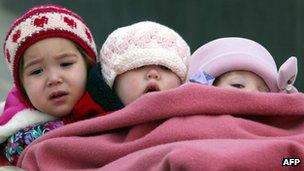'High poverty' among Canada native children - report
- Published

Children from Inuit groups suffer a 27% poverty rate, compared to 17% for all Canadian children
Four in 10 indigenous Canadian children live in poverty, a figure more than twice the national rate, a report has found.
Groups registered with the government and living on reserve land suffer even higher child poverty, the study found, external.
The report by the Canadian Centre for Policy Alternatives and Save the Children Canada used 2006 census data.
It linked the poverty to "the legacy of colonialism" and underfunding of basic services, particularly on reserve land.
"Indigenous children trail the rest of Canada's children on practically every measure of wellbeing: family income, educational attainment, poor water quality, infant mortality, health, suicide, crowding and homelessness," the report found.
According to the report released on Wednesday, 40% of all indigenous Canadian children live below a statistically derived low income threshold.
That includes "status First Nations" children in tribes and bands registered with the government and living on reserve land, as well as Inuits, children of mixed heritage, and others,
Seventeen per cent of all Canadian children live in poverty, while among non-indigenous children of all races and ethnic backgrounds, the figure is 15%.
'Disturbingly slow' progress
Among Status First Nations the figure is 50%.
Status First Nation Children in the prairie provinces of Manitoba and Saskatchewan fare the worst, with almost two-thirds living below the poverty line.
The report recommends increasing funding for education, healthcare, social services and direct welfare payments to families with children, as well as support for indigenous entrepreneurship. It estimates it would cost about 1bn Canadian dollars ($979m; £626m) to lift all indigenous children up to the poverty line.
"Progress in providing basic services for Indigenous peoples such as safe water, good-quality education and adequate housing remains disturbingly slow," the reports authors wrote.
"Failure to act will result in a more difficult, less productive, and shorter life for Indigenous children."
- Published25 March 2013
- Published17 January 2013